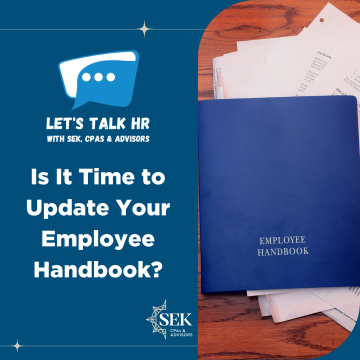Is your money-losing activity a hobby or a business?
Let’s say you have a sideline activity that you consider a business. Will the IRS agree that your venture is a business, not a hobby? It’s an essential question for tax purposes. We may be able to help you prove your money-losing activity is really a for-profit business that hasn’t paid off yet. That way, you can deduct the losses. Contact the CPAs and tax advisors at SEK for help.
Don’t be afraid of probate
Few estate planning subjects are as misunderstood as probate. In basic terms, probate is the process of settling an estate and passing legal title of ownership of assets to heirs. If the deceased person has a valid will, probate begins when the executor named in the will presents the document in the county courthouse. Its biggest downside is the fact that probate is public. Contact the estate planning advisors at SEK for additional details on the probate process.
Nonprofit board independence is about more than avoiding conflicts of interest
Some nonprofit leaders mistakenly believe that board member independence is only about addressing conflicts of interest. But director independence goes beyond avoiding conflicts of interest. In fact, the IRS has a four-part definition of independence. If a majority of your organization’s board members don’t meet all four criteria, the IRS, donors and other stakeholders could call your governance into question. Contact the nonprofit advisors at SEK for details.
Unlock your child’s potential by investing in a 529 plan
If you have a child or grandchild planning to attend college, you may wonder about investing in a qualified tuition program or 529 plan. You don’t get a federal tax deduction for contributions, but the earnings aren’t taxed while the funds are in the program. Contact the CPAs and tax advisors at SEK to learn more.
Achieve multiple estate planning goals with one trust: A CRT
Two common estate planning goals are contributing to a favorite charity and leaving significant assets to your family under favorable tax terms. A charitable remainder trust (CRT) can help you achieve both goals. Contact the CPAs and estate planning advisor at SEK for details.
Separating your business from its real estate
Does your business own real estate titled under the business’s name? With long-term tax, liability and estate planning advantages, separating real estate ownership from the business may be a better choice. Contact the CPAs and business tax advisors at SEK to learn more.
Is it time to update your employee handbook?
An employee handbook serves as the foundation for establishing clear workplace policies, setting expectations, and ensuring legal compliance. Yet, many employers overlook the importance of regularly reviewing and updating their handbooks.
SEK named one of the Best Places to Work in PA for 2024
Central Penn Business Journal and Lehigh Valley Business have named SEK, CPA & Advisors as one of the 2024 Best Places to Work in PA in the medium employer category. The awards are held in partnership with Best Companies Group.
Seller-paid points: Can homeowners deduct them?
Potential homebuyers may now have an opportunity to attain their dreams of purchasing property. If you’re a homebuyer, you may wonder if you can deduct mortgage points paid on your behalf by the seller. The answer is “yes,” subject to some limits. Contact the CPAs and tax advisors at SEK for answers to your tax questions.
What are the duties of an executor?
A key decision you must make when drafting your estate plan is who to appoint as the executor. Your first inclination may be to name a family member. But this can cause complications. Frequently, a professional advisor whom you trust is a good alternative. Contact the estate planning advisors at SEK with your questions.









